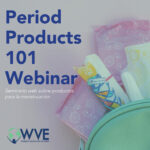The Nation’s First Menstrual Products Disclosure Law Goes into Effect in New York
Advocates conduct field studies to ensure companies are providing ingredient information in period care products, now required by law in New York State
(Albany, New York – October 20, 2021) – Companies selling tampons, pads, menstrual cups or period underwear in New York State are now required to disclose all intentionally added ingredients on product labels.
In 2019, New York became the first state in the nation to require period product makers to disclose ingredients by passing A.164-A/S.2387, introduced by Assembly Member Linda B. Rosenthal (D-Manhattan) and Senator Roxanne J. Persaud (D-District 19). The law went into effect this October. There is no federal requirement to disclose, and without requirements, regulations or clear standards, only a few companies were voluntarily providing limited ingredient information. While passed in New York, this law sets a new precedent for period product ingredient disclosure.
“This is a no-brainer and is long overdue. We have come to expect disclosure of ingredients in foods and cosmetics, because of the direct interaction of these products with our bodies. We should expect, and deserve, no less from menstrual products,” said Amber Garcia, Executive Director of Women’s Voices for the Earth (WVE). “No one should have to worry that their period products will cause harm to their health or future fertility. By keeping ingredients a secret, people are denied vital information necessary to make informed decisions about their health. Finally, we will have access to essential information to start closing this obstructive gap in healthcare.”
Tampons, pads and menstrual cups are considered ‘medical devices’ by the Food and Drug Administration (FDA) and are not subject to ingredient labeling. As a result, ingredients used in these products have historically rarely been disclosed publicly, or made easily available to people who rely on these products to manage their menstrual health.
Menstrual care products come into contact with one of the most sensitive and absorbent parts of the body. Potentially harmful substances like nanosilver are found in some period underwear and pads. Nanosilver is effective at killing bacteria, including lactobacilli, which is necessary for a healthy vagina. Testing has also found PFAS in period underwear; PFAS are known as “forever chemicals” because they never break down, remain present in the human body and are linked to a wide variety of harms to human health, including cancer and fertility issues. Additional testing of tampons and menstrual pads have found pesticide residue, parabens and phthalates linked to hormone disruption, other antibacterial chemicals like triclosan, and various carcinogens including styrene and chloroform. The studies on the effects these chemicals have on health are insufficient, and people are not aware of what they are being exposed to in their period products.
“People expect that when they purchase a product it’s been rigorously tested to ensure it’s safe. Sadly, this is not true when it comes to product ingredients. At a minimum, we should know what chemicals go into menstrual products, and companies should plainly disclose those ingredients,” said Bobbi Wilding, Executive Director at Clean and Healthy New York (CHNY). “We should be able to avoid the awful irony of putting reproductive toxicants into or up against our bodies as we seek to manage our reproductive cycles. CHNY is proud that New York is helping to bring this information to the US market and to empower people to protect their health.”
As part of the rollout of this new law, WVE is organizing advocates to conduct field studies to learn more about which companies are complying to these new disclosure requirements by surveying various local stores and products in the state of New York. Advocates are also encouraged to participate throughout the nation to see how this law is impacting ingredient transparency practices beyond New York State.
“In short, we will hold corporations accountable,” said Mrittika Howlader, a fellow at Women’s Voices for the Earth who is helping organize several field studies. “Millions of people use these products, and for far too long, millions have been denied the simple knowledge of knowing what is in a tampon or pad. We fought hard to pass this bill and we’ll fight hard to make sure it’s being enforced.”
“WVE’s community works hard to ensure that people are able to see what is in their products, and that toxic chemicals are not present in the products that we all use in our everyday lives. And now, armed with this new law, we’ll be able to single-out companies that are looking out for the people who use their products, and those who are not.”
Policies addressing period health and menstrual equity are gaining traction throughout the nation. In 2021, more than 140 bills have been introduced in 37 states, including eight federal bills to address the safety, access or affordability of menstrual care products. Of note is the Menstrual Equity For All Act, reintroduced by Congresswoman Grace Meng, to help make menstrual products more affordable and accessible by ensuring, among other things, that period care is covered in public and nutritional programs like Medicaid, and supporting grants and funding for menstrual care products in schools, prisons, and homeless and domestic violence shelters.
“We can’t choose whether or not we get a period. Period products are not luxury items—they are an essential need. Everyone who does get a period has the right to affordable, accessible, and safe period products, no matter where they live or what products they use,” said Garcia. “Menstrual health has long been stigmatized, neglected and ignored. While we continue to have an uphill battle to ensure the health of women, girls and all people who menstruate is prioritized and not politicized, it is encouraging to see menstrual equity practices and policies finally being included as an important part of public health needs and health care.”
———————————————-
About Women’s Voices for the Earth (WVE)
Founded in 1995, Women’s Voices for the Earth is a national environmental health organization that works to amplify women’s voices to eliminate toxic chemicals that harm our health and communities. WVE’s menstrual products work was launched in 2013 with the report, Chem Fatale, and has helped elevate the topic of period health into the public mainstream. www.womensvoices.org
Media Contacts:
Beth Conway | Communications Director, Women’s Voices for the Earth
bethc@womensvoices.org, (406) 543-3747 office
Bobbi Wilding | Executive Director, Clean & Healthy New York
bobbi@cleanhealthyny.org, (518) 641-1552 office





